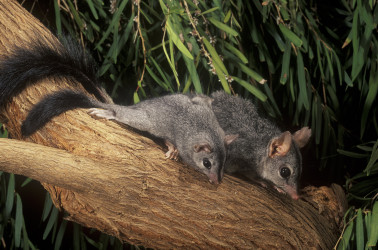The Foundation for Australia’s Most Endangered Species Ltd (FAME) is committed to securing a future for the Eastern Bettong by financially supporting two important projects:
- At Borung in Central Victoria (80 km northwest of Bendigo) we are partnering with Orana Park Safe Haven and project partners to reintroduce the Eastern Bettong to unspoiled grasslands and woodlands habitat. Feral-proof fencing will be installed around 200 hectares of native vegetation in order to form a permanent haven. The project will also secure populations of Eastern Barred Bandicoots, Brush-tailed Phascogales, Yellow-footed Antechinuses, Fat-tailed Dunnarts and many species of birds including the critically endangered Swift Parrots and endangered Plains Wanderers.
- At Barrington Tops near Gloucester in NSW we are supporting our partners Aussie Ark to reintroduce Eastern Bettongs as a semi-wild population. This will be behind predator-proof fences that enclose 375 hectares of native habitat. This project will also support populations of the Southern Brown Bandicoot and the Long-nosed Potoroo.
These reintroduction projects are only possible because the absence of foxes in Tasmania meant the Eastern Bettong survived there. Additionally, we have proof that a reintroduction project for Eastern Bettongs does work. In 2012 a small number of Bettongs were reintroduced to the Mulligan’s Flat feral-free area on the outskirts of Canberra. This has been successful and has inspired FAME to support the two projects outlined above.
Creating these safe havens will protect two additional populations of Eastern Bettongs from cats and foxes, and provide additional populations of animals for future reintroductions on the mainland.
Eastern Bettong populations can increase rapidly. Each female can breed up to three times a year and each will survive in the wild for between three and five years. The gestation period is short at just 21 days, after which the joey remains in the pouch for an additional 15 weeks.
What they most need is to be kept safe from introduced predators.
With your help, the Eastern Bettong will make a comeback in NSW and Victoria in the very near future.
UPDATES
- 31 OCTOBER 2020; Project update: Predator-proof fence complete at Orana Sanctuary. Read more: Project update
Photo credits:
Eastern Bettong: By JJ Harrison (jjharrison89@facebook.com) - Own work, CC BY-SA 3.0, https://commons.wikimedia.org/w/index.php?curid=11078317
Fat-tailed Dunnart: Animals AnonymousBrush-tailed Phascogale: Lochman Transparencies ©
Burton’s Legless Lizard: By Matt Clancy Wildlife Photography – https://www.flickr.com/photos/88708273@N03/10681750643/in/photolist-hgULjx-hgR7x7-ef2Uq4-ef2Wwp-hgR9XZ-ef8Ajh, CC BY 2.0, https://commons.wikimedia.org/w/index.php?curid=30189415
Plains Wanderer: By Patrick_K59 - Plains Wanderer (Pedionomus torquatus) male, CC BY 2.0, https://commons.wikimedia.org/w/index.php?curid=34831381
Swift Parrot: By Gunjan Pandey - Own work, CC BY-SA 4.0, https://commons.wikimedia.org/w/index.php?curid=73576507
Yellow-footed Antechinus: Geoff Park





